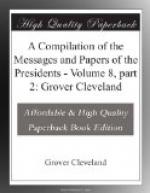The present crisis in Europe is favorable for pressing such a settlement, and not a moment should be lost in availing ourselves of it. Should it pass unimproved, our situation would become much more difficult. Formal war is not necessary—it is not probable it will follow; but the protection of our citizens, the spirit and honor of our country require that force should be interposed to a certain degree it will probably contribute to advance the object of peace,
But the course to be pursued will require the command of means which it belongs to Congress exclusively to yield or to deny. To them I communicate every fact material for their information and the documents necessary to enable them to judge for themselves. To their wisdom, then, I look for the course I am to pursue, and will pursue with sincere zeal that which they shall approve.
TH. JEFFERSON.
DECEMBER 11, 1805.
To the Senate of the United States:
I now lay before the Senate the several treaties and conventions following, which have been entered into on the part of the United States since their last session:
1. A treaty of peace and amity between the United States of America and the Bashaw, Bey, and subjects of Tripoli, in Barbary.
2. A treaty between the United States and the Wyandot, Ottawa, Chippewa, Munsee, and Delaware, Shawnee, and Potawatamie nations of Indians.
3. A treaty between the United States and the agents of the Connecticut Land Companies on one part and the Wyandot, Ottawa, Chippewa, Munsee, and Delaware, Shawnee, and Potawatamie nations of Indians.
4. A treaty between the United States and the Delawares, Potawatamies, Miamis, Eel-rivers, and Weeas.
5. A treaty between the United States and the Chickasaw Nation of Indians.
6. A treaty between the United States of America and the Cherokee Indians.
7. A convention between the United States and the Creek Nation of Indians; with the several documents necessary for their explanation.
The Senate having dissented to the ratification of the treaty with the Creeks submitted to them at their last session, which gave a sum of $200,000 for the country thereby conveyed, it is proper now to observe that instead of that sum, which was equivalent to a perpetual annuity of $12,000, the present purchase gives them an annuity of $12,000 for eight years only and of $11,000 for ten years more, the payments of which would be effected by a present sum of $130,000 placed at an annual interest of 6 per cent. If from this sum we deduct the reasonable value of the road ceded through the whole length of their country from Ocmulgee toward New Orleans, a road of indispensable necessity to us, the present convention will be found to give little more than the half of the sum which was formerly proposed to be given. This difference is thought sufficient to justify the presenting this subject a second time to the Senate. On these several treaties I have to request that the Senate will advise whether I shall ratify them or not.




